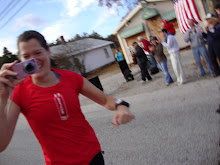"Why would anyone want to run 50 miles?" This is a question many people have asked me - and now they're starting to ask Shauna and other relatives of mine. Well, it's a good question!
Two days ago I told Shauna, "I guess you can tell people that I want to run 50 miles because I think I can, and I want to find out." I was sitting on comfortable sofa with my feet propped up on a coffee table, having just completed a weekend's worth of long runs, and looking forward to 36 hours of not having to run, and it seemed like a good answer. But it was also kind of a selfish answer. I, I, I...
This morning my training resumed, and as I hurtled myself out into the pre-dawn darkness, the question didn't seem so easy to answer. "Why?" "Do I
really want
this?"
Ray loves to read biographies of world-class athletes (which we definitely are not). We've read a few of them together, and it struck me that many of these athletes also ask "What does it mean?" and struggle to make their extraordinary talent meaningful. Transatlantic rowers Julie and Colin Angus used their experience to further our understanding of the ocean and our impact on it. Swimmer Lynne Cox decided to use her natural swimming talent to further international relations and intercultural understanding; in 1987 she swam, for example, across the Bering Strait between what was then the Soviet Union and the United States. Ultrarunner Dean Karnazes was touched by a little girl with cancer, and he ran a race for her.
We all know Lance Armstrong, whose cause found him. I'm reading his book now. Its title is It's Not About the Bike. I love the title! Because it's not about the bike, the boat, the swim, or the run.
So what is it about?
Well, I do want to see if I can run 50 miles. WE - Ray and I - want to. If we stopped wanting it, no one else would say, "Awwww, c'mon!" Maybe it is selfish. Because of running, I take time away from other people - my friends, my work, etc. I spend money on shoes and entry fees. Just because I want to see if I can.
But the experience of running (like lots of experiences, really) can be a great teacher about life. You learn that you can do more than you think. You learn that can't do everything. You learn that there are things you can control. You learn that there are things you can't control. You learn, in sum, what it does and doesn't mean to be a human soul in a human body.
I think that's why sports pursuits and disease awareness/research fundraising seem to go hand in hand. Race for the Cure. AIDS Walk. Avon Walk for Breast Cancer. At these events, survivors reclaim their bodies from disease, loved ones remember those who died, and everyone shares in the physical pursuit of a goal that is, really, celebrating and honoring human souls that (for a while) occupy human bodies, as best we can.
At the beginning of his book, Lance Armstrong writes:
Good, strong people get cancer, and they do all the right things to beat it, and they still die. That is the essential truth that you learn. People die. And after you learn it, all other matters seem irrelevant. They just seem small....
People die. That truth is so disheartening that at times I can't bear to articulate it. ....But there is another truth, too. People live. It's an equal and opposing truth. People live, and in the most remarkable ways. When I was sick, I saw more beauty and triumph and truth in a single day than I ever did in a bike race - but they were human moments, not miraculous ones....
I still don't completely understand it. (pp. 3-5)
So, why? Because we (humans) can (rise above our bodies, and our spirits can triumph even in pain, suffering, and defeat, and looking back we will say that it's worth it).



